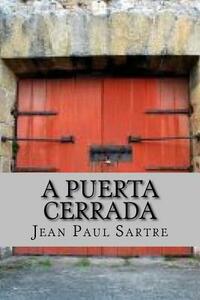You need to sign in or sign up before continuing.
Take a photo of a barcode or cover
It was good. It reminded me of an episode of The Twilight Zone. I’m sure for it’s time it was groundbreaking. I liked the beginning more than the end.
"Hell is other people." This play is absolutely hilarious, because it puts such an interesting spin on our concept of Hell and the tortures awaiting those of us who are heading there in the afterlife. The idea that two people can drive you absolutely batshit is incredibly resonant, especially when compared to the fact that you can also drive those two people absolutely batshit in turn. Isn't it our interactions with others that make us so angry in our daily lives? And isn't it true that alone, the demons are even more terrifying? We need each other just as much as we are repulsed by each other. And if Hell is the same as Earth, then what, exactly, is so bad about that? What's good about it?
Sartre plays on a lot of elements in this script, with obvious inclusion of existential elements as well as fierce humor. But the thing that stands out about each of these characters is that they are all so irrevocably human, and that, ultimately, is what dooms them all.
Sartre plays on a lot of elements in this script, with obvious inclusion of existential elements as well as fierce humor. But the thing that stands out about each of these characters is that they are all so irrevocably human, and that, ultimately, is what dooms them all.
reflective
fast-paced
Plot or Character Driven:
A mix
Strong character development:
No
Loveable characters:
Complicated
Diverse cast of characters:
No
Flaws of characters a main focus:
Yes
Huis clos: 5/5
Les mouches: 3/5
Les mouches: 3/5
Conceptually, great. I think it's a very interesting decision to depict Hell as a Second Empire style drawing room occupied by only three people. Despite death, the characters continue to muse about their existence, without any effect. The only people they have to convince of their identity is each other, and (I believe) they realize that their identity is not something that is constructed by themselves, but by those around them. Overall, I wasn't super impressed with the play. I felt that the characters, especially the two females were not particularly distinct, and I wasn't sure their motives were that clear. Were they trying to escape Hell? To figure out if there was a higher purpose for the three of them to be grouped together? To convince each other of their sense of being? I would have liked Hell to have played a bigger role in the play, as it just seemed like a way to bring about conversations of existence rather than to figure in any prominent sort of way. In general, after reading, I felt that I was either missing some larger message, or that the message was perhaps not anything I found to be particularly insightful.
No Exit is a play by Jean-Paul Sartre that shows his existential philosophy and how he thinks humans exist in the world. Sartre beliefs that “the other is hell” because they can control you and you can’t control the way that others see you. And he demonstrates this by putting three characters, Garcin, Estelle, and Inez in a room together for eternity. This was a really funny read and I definitely want to see it performed on stage. I feel my reading experience was enhanced by discussing Sartre’s philosophy in class and would definitely recommend it if you are learning about Sartre, but it is also a good read if you don’t know much about Sartre’s philosophy.
"Tu es moite ! Tu es molle ! Tu es une pieuvre, tu es un marécage."






